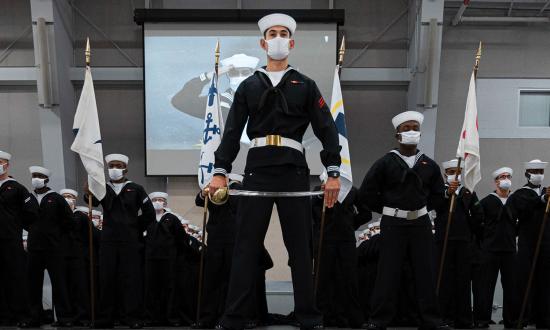I am a surface warfare officer serving as a first tour division officer on board the USS Pearl Harbor (LSD-52). I also am a Mexican American, son of immigrant parents, first-generation college graduate. Until the night my father was detained by border patrol agents, I had not realized I was different. I remember driving to the detention center on the border of the same city I had lived in for more than 14 years, seeing my father behind bars for no reason other than being born below the U.S.-Mexico border and seeking a better life for his family.
The good news is, after two weeks of being separated from us, my father got a court date and the immigration judge granted him residency. I wish I could say it ended there.
Three months later, my mother and older brother were stopped by border patrol agents on their way home from the pharmacy, detained, and deported to Mexico. When the officer pulled them over, my eight-month-old brother was in the backseat of the car. The officer called my father at work and told him he had to pick up his baby because his wife and eldest son were going to be deported.
When I came home, my younger siblings were all crying. I remember holding my sister, Bianca, as she cried uncontrollably, asking why they had taken our mother. I didn’t know how to answer.
Because of his deportation status, my older brother was unable to finish high school, let alone pursue his dreams of higher education. With my mother away from home, my older sister had to drop out of high school to care for our younger siblings. Given the age of our baby brother, we needed to keep him and my mother together. This meant we had to take him across the border into Mexico. I held him as my uncle and I walked into Tijuana, and I couldn’t help but feel this sinking guilt. I felt I had not done enough to protect my family.
During this time, the pledge of allegiance I recited every day in school lost its meaning. I no longer saw America as the land of liberty and justice for all. I started seeing the color of my skin as a barrier to social equality—that my brown skin was enough justification to pull me over and question my nationality. I felt betrayed.
But at the same time, I refused to believe that American democracy excluded me from sharing the same rights as every citizen. I refused to believe that family unity for children who are U.S. citizens and their immigrant parents is a crime.
Family Sacrifice
On 30 July 2020, my brother-in-law, Lance Corporal Marco Barranco, died during an amphibious training exercise off the coast of San Clemente Island. He and seven other Marines and a sailor were trapped inside an amphibious assault vehicle that sank on its way back to the USS Somerset (LPD-25).
My brother-in-law was the reason I chose an amphibious ship, back when I was in Officer Candidate School. He joined the Marine Corps first, and shortly after, I joined the Navy. I had hoped that one day we would deploy together and, if it came to it, fight together. I wanted to be there if we needed to lay down our lives for the sake of our family’s freedom.
Marco was always proud of me being an officer. When I lost him, I felt like I lost my purpose in the Navy. The person I wanted to be there for, as a service member, was gone. With time, I came to realize that his admiration was something I would carry with me forever. His support of my becoming a qualified surface warfare officer is what brought me back around emotionally.
Just as the waves started to settle, my family was struck by yet another tragedy. On 24 October 2020, my father passed away, leaving my mother and 12 children.
When I was in high school my father worked two jobs to provide for us. There would be times he would be gone all day and into the late evening. His work ethic is my own. His drive and motivation to provide for his family are my own. And the family he leaves behind is now my own.
While I am the third child, I am the first U.S. citizen in my family. My two older siblings are DACA recipients; my nine younger siblings and I are all U.S. citizens. When my father passed away, they looked to me for reassurance and stability. Six of my younger siblings still lived at home at the time. Without a stable income, they and my mother face an uncertain future. Without “deferred action,” my mother faces the risk of deportation, which would leave me the responsibility of caring for six of my siblings, whether I am at Naval Base San Diego or on deployment.
I would love nothing more than to be able to provide for my family as my father did, but I cannot do so worry-free. I live with the fear of losing my mother because of her immigration status. Having experienced great losses back to back, I have had a hard time refocusing and directing my full attention on the mission in front of me.
I am afraid that losing my mother would break me. I am relearning to find motivation in what I do but fear another loss might affect my ability to carry out my duties and responsibilities as a naval officer. I am willing to sacrifice my life for my country; all I ask is the reassurance that my family will be secure when I deploy.
The Sea Services Can Act
The Sea Services need a new policy that not only will uphold the American dream, but also will increase diversity and create an inclusive workplace for all service members.
While the military offers Parole in Place for a service member’s parents, it is only a temporary solution, affording them no real legal status. A service member’s parents cannot apply for an adjustment of status unless they can overcome multiple hurdles. The most predominant ones fall under the requirements for Form I-601A, “Application for Provisional Unlawful Presence Waiver.”
Under this provision, the applicant must have a qualifying relative who can demonstrate they would experience extreme hardship if the applicant’s petition were denied. This qualifying relative must be a spouse or parent who is a U.S. citizen or permanent legal resident. What if both parents have no lawful status, and the service member is a first-generation Mexican American? His parents would not qualify for the waiver and would never receive any form of real legal status.
Recently, U.S. Citizenship and Immigration Services implemented deferred action as another form of discretionary relief. But just like Parole in Place, deferred action offers no way forward for adjustment of status to undocumented parents. All it does is delay what has been deemed the inevitable result of being undocumented: removal and deportation.
As service members, fearing the removal and deportation of our undocumented parents is detrimental to the warfighter mentality we must embody.
Change Is Possible
I am not alone. I am the command citizenship representative on board the Pearl Harbor. There are two other sailors on board with experience similar to mine. Their parents will never receive anything but a delay in their removal and deportation. If there are two sailors here, I guarantee there are myriad more throughout the fleet.
Change is possible. If change comes about, equality and inclusivity for our diverse Navy will follow.
I want to be the voice for all the families within our ranks who are victims of a broken immigration system. I believe as, Martin Luther King Jr. wrote in his letter from Birmingham Jail, that “injustice anywhere is a threat to justice everywhere.” I have a duty as an officer in the U.S. Navy to practice and ensure equality at every level within our command.







